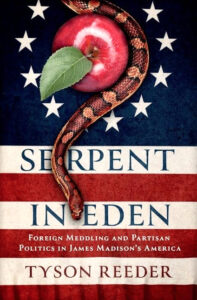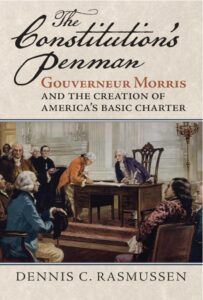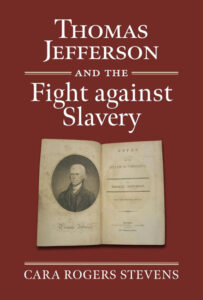Since 2014, the Journal of the American Revolution has recognized the new adult nonfiction volume that best mirrors the mission of the journal with its national Book-of-the-Year Award. This year the editors are pleased to announce a winner and two runners-up. All three books are outstanding contributions to the history of the Revolutionary and Founding Eras.
Award Winner
Serpent in Eden: Foreign Meddling and Partisan Politics in James Madison’s America by Tyson Reeder. Oxford University Press.
 Just as the snake in the book of Genesis in the Old Testament used duplicity and cunning to entrap Adam and Eve, foreign agents did their best to try to ruin any chances of success for the infant American nation. The United States was as defenseless and weak as a new-born babe, and France, Great Britain, Spain and various indigenous nations played a dangerous game of politics in the hopes that the young republic would topple over before it could take its first step.
Just as the snake in the book of Genesis in the Old Testament used duplicity and cunning to entrap Adam and Eve, foreign agents did their best to try to ruin any chances of success for the infant American nation. The United States was as defenseless and weak as a new-born babe, and France, Great Britain, Spain and various indigenous nations played a dangerous game of politics in the hopes that the young republic would topple over before it could take its first step.
The 2024 Journal of the American Revolution book award winner, Tyson Reeder’s Serpent in Eden: Foreign Meddling and Partisan Politics in James Madison’s America, is an exciting and illuminating story of how close the United States came to failing due to the undercover actions of foreign powers. The book begins with the embarrassing story of British spy John Henry, who convinced the Madison administration to give him fifty thousand dollars for useless information that was supposed to embarrass Federalists. His situation demonstrates how open the United States was to being taken advantage of by determined foreign nations. Washington’s presidency was almost torn apart because of events taking place in revolutionary France, which led to the formation of opposing political parties. Reeder provides an insightful look at how vulnerable the nation was as a result of party strife and foreign meddling. Great Britain sought vengeance, France sought a military alliance, Spain wanted to protect its possessions in the west, and Native American nations were hoping to survive.
There were many familiar characters involved with the manipulative activities: Talleyrand, Tecumseh and his brother the Prophet, Aaron Burr, Edmund Genet, Tadeusz Kosciuszko, and of course John Henry. Reeder includes the conditions that led to the Jay Treaty, the XYZ Affair and the Quasi-War with France, and the Louisiana Purchase. The book ends with the burning of Washington by the British in the War of 1812 and the fight against the Western Confederacy during the Madison administration.
Serpent in Eden: Foreign Meddling and Partisan Politics in James Madison’s America is an excellent read, providing the reader with an intense narrative and making one wonder how it was possible that the United States was able to hang on to existence in the face of the constant intrigue and interference.
See our review of Serpent in Eden.
Runners-Up
The Constitution’s Penman: Gouverneur Morris and the Creation of America’s Basic Charter by Dennis C. Rasmussen. University Press of Kansas.
 Gouverneur Morris exerted a profound influence at the Constitutional Convention and on the final form of the Constitution but remains relatively unknown. In The Constitution’s Penman, Dennis C. Rasmussen rescues this fascinating figure from obscurity. The book is not a conventional biography; instead, it emphasizes Morris’s role at the Constitutional Convention. Morris addressed the Convention more than any other delegate, and as a member of the committee that produced the final draft of the Constitution, he was assigned the primary role in writing the document. Morris composed the Constitution’s famous preamble and condensed the twenty-three draft articles into seven.
Gouverneur Morris exerted a profound influence at the Constitutional Convention and on the final form of the Constitution but remains relatively unknown. In The Constitution’s Penman, Dennis C. Rasmussen rescues this fascinating figure from obscurity. The book is not a conventional biography; instead, it emphasizes Morris’s role at the Constitutional Convention. Morris addressed the Convention more than any other delegate, and as a member of the committee that produced the final draft of the Constitution, he was assigned the primary role in writing the document. Morris composed the Constitution’s famous preamble and condensed the twenty-three draft articles into seven.
Rasmussen examines Morris’s impact on the final form of the Constitution, such as his advocacy of a strong central government, and his helping to craft the Electoral College after delegates rejected his plan for direct popular election of the president. While his plan to have the president choose senators, who would serve for life, failed, Morris was more successful in his efforts to balance power between the executive and legislative branches of government so that neither could encroach on the other. Many of Morris’s goals for the judiciary, such as judicial review and the creation of lower federal courts in addition to the Supreme Court, were eventually realized although they were not specifically included in the Constitution. Morris did fail in one area of great importance to him: convincing the delegates to abolish slavery.
The Constitution’s Penman is informative, solidly researched, and well written, with occasional flashes of humor. Everyone with an interest in the Revolutionary and Early National eras, and the framing of the Constitution, will likely find new information and fresh insights in Rasmussen’s work.
See our review of The Constitution’s Penman.
Thomas Jefferson and the Fight Against Slavery by Cara Rogers Stevens. University Press of Kansas.
 Thomas Jefferson’s views, actions, and inaction on slavery are at the forefront of America’s historical consciousness. The founding father, president, and author of the Declaration of Independence is now derided by many as petty, profligate, hypocritical, licentious, and racist. Cara Rogers Stevens goes beyond condemnation on a quest to find actual answers. Jefferson’s own views on an issue that was largely uncontroversial before the Revolution understandably evolved over time. Surprisingly, it is possible to physically trace some of that evolution by looking at different drafts of his Notes on the State of Virginia. He revised the text many times by pasting new sections onto old ones.
Thomas Jefferson’s views, actions, and inaction on slavery are at the forefront of America’s historical consciousness. The founding father, president, and author of the Declaration of Independence is now derided by many as petty, profligate, hypocritical, licentious, and racist. Cara Rogers Stevens goes beyond condemnation on a quest to find actual answers. Jefferson’s own views on an issue that was largely uncontroversial before the Revolution understandably evolved over time. Surprisingly, it is possible to physically trace some of that evolution by looking at different drafts of his Notes on the State of Virginia. He revised the text many times by pasting new sections onto old ones.
Rogers Stevens reports that Jefferson’s antislavery views were sincere, and he planned to change minds through education. His plan presaged a little-remembered movement toward abolition in Virginia that featured his private secretary William Short, Robert Carter III (reportedly the greatest private emancipator in American history), and Jefferson’s own grandson, Thomas Jefferson Randolph, who pressed the issue as a member of the Virginia General Assembly in the 1830s. Thomas Jefferson and the Fight Against Slavery does not let our third president off the hook. However, Rogers Stevens has found answers to some of American history’s most important questions, leaving The Sage of Monticello looking a little better.
See our review of Thomas Jefferson and the Fight Against Slavery.





Recent Articles
The Sieges of Fort Morris, Georgia
This Week on Dispatches: Scott Syfert on the Mecklenburg Declaration
Richard Cranch, Boston Colonial Watchmaker
Recent Comments
"The Mecklenburg Declaration of..."
I am not sure I will ever be convincingly swayed one way...
"The Mecklenburg Declaration of..."
Interesting! Thanks, from a Charlotte NC Am Rev fan.
"The Mecklenburg Declaration of..."
A great overview of that controversial document. I tend not to accept...